Robot coding for kids hot in China
By Wu Yong (China Daily) Updated: 2017-05-29 08:25Educationalists say language creates rich dialogue between mankind and machines
Five-year-old Duoduo is clearly hooked on her new toy, a blue robot called Dash. The only child in her family, Duoduo teaches the robot how to dance on her iPad - even naming it meimei, or little sister.
Dash - a programming robot compatible with iOS and Android devices that can be controlled through mobile apps - was designed by Silicon Valley-based Wonder Workshop Inc, and became popular in the Chinese market from last year.
"Our slogan is that coding is the new English. If the English language is a universal communications tool for people, coding is another vital tool for dialogue between human beings and machines in the age of artificial intelligence," said Brian Yang, general manager Asia Pacific at Wonder Workshop, a manufacturer of toy robots which teach kids how to code.
|
Contestants play Lego robot football, at a robot competition in Suzhou, Jiangsu province. Wang Jianzhong / For China Daily |
"We're not aiming to train geeks, but foster children's logical thinking and creativity. Learning programming will lay solid foundations for the future," he added.
The company says the past few years have seen coding classes start up in over 24 countries, among them the US, Germany and South Korea.
Educationalists say more parents want their children to be better prepared for the future, especially one in which the central government has set a goal of boosting the nation through science and education.
The Ministry of Education issued a series of documents to facilitate the teaching of science.
The latest requirement published this February asked that all standard elementary and middle schools offer science classes, to help create a more innovative country.
Denmark's Lego group has pioneered promoting robot education programs in China. In 2010, Lego started a creative talent training program with the Ministry of Education.
Chen Jiaoli, general manager of Lego education China, said that to date over 6,000 schools had adopted her company's program, which teach children from the ages of 3 years up the basics of coding and programming.
The company announced that it would boost the development of children's programming products this year.
Educationalists say China is known for its big investment in education and say it is important for China's 'economic miracle.'
They say children's education accounts for an estimated 20 to 30 per cent of total household income.
Parents born in 1980s reportedly have higher expectations and requirements for education and they believe coding may help their children gain a competitive advantage in the future.
Professor Cao Xiang at the School of Economic Management, Tsinghua University said
"Coding is useful and important, as the world and future will be driven by more and more computing technology and the best example is AlphaGo's victory last year. Or at least, technology helps children in school work in terms of maths, logic and physics."
Educationalists say that China's total investments in educational technology in 2013 were only one fourth that of the United States. But, they add, that only two years later China's investment of $1.34 billion was 30 percent more than the US total.
Educational technology companies that aim to serve 180 million children are the most active players in the Chinese market, attracting more than half of the total investment in the sector.
An estimated seven out of top 10 investment deals in educational investments go to educational technology in China, according to Angela Bao, a senior investment manager at Beijing-based venture capital company Sinovation Ventures.
"Wonder Workshop is a world-leading company that has very good products, software and team. It already has more than 10,000 school users globally," Bao said.
"We believe the company can provide a whole set of systems, from curriculums to hardware, which is easily accepted by schools," she added.
Listed company Beijing Shengtong Printing Co Ltd recently announced it spent 14.21 million yuan ($2.1 million) taking a five percent stake in a newly founded children's coding company.
Last year, Beijing Shengtong also invested 430 million yuan in acquiring 100 percent of another children's robot coding company in Beijing.
Analysts say that the children's robot programming sector is hot, both internationally and in the mainland, with investors lining up to provide funding.
Educationalists say that some parents worry that learning coding - a booming market that starts with kids as early as 3 years - is vital in the early years and that by high school teenagers who haven't done courses have missed the boat.
"Children's programming provides logical thinking and a sense of regularity," says He Xuan, a computer researcher at Dongbei University who is also a mother of two. "This is helpful for their daily lives and education."
She currently plays Kodable, a popular kid coding app with her 5-year-old son.
Liu Ling, a professor of child psychology at Shenyang Normal University, suggested that parents should balance computer studies and outdoor activities to ensure their children's health, both physically and psychologically.
After seeing the positive change that Dash had on Duoduo, her classmates want to join in the fun and Duoduo's mother says she is thinking of organizing a programming team for them.
Li Haoran contributed to the story.
wuyong@chinadaily.com.cn
- 'Cooperation is complementary'
- Worldwide manhunt nets 50th fugitive
- China-Japan meet seeks cooperation
- Agency ensuring natural gas supply
- Global manhunt sees China catch its 50th fugitive
- Call for 'Red Boat Spirit' a noble goal, official says
- China 'open to world' of foreign talent
- Free trade studies agreed on as Li meets with Canadian PM Trudeau
- Emojis on austerity rules from top anti-graft authority go viral
- Xi: All aboard internet express












